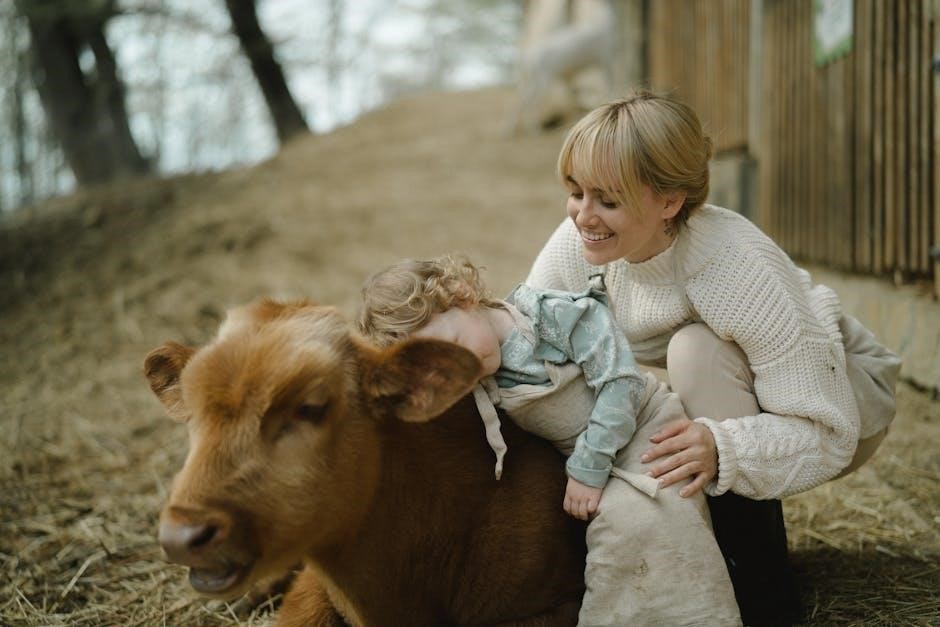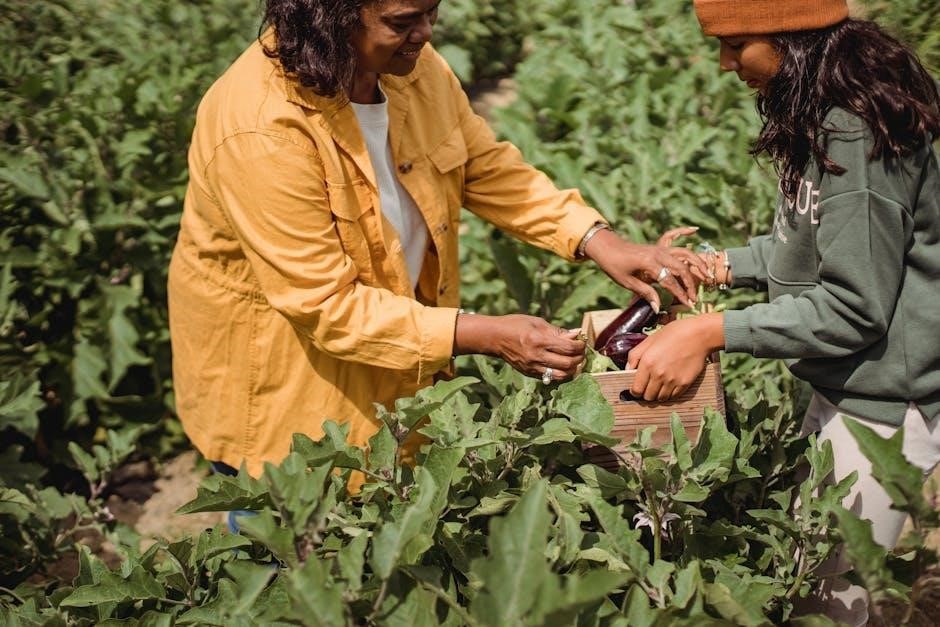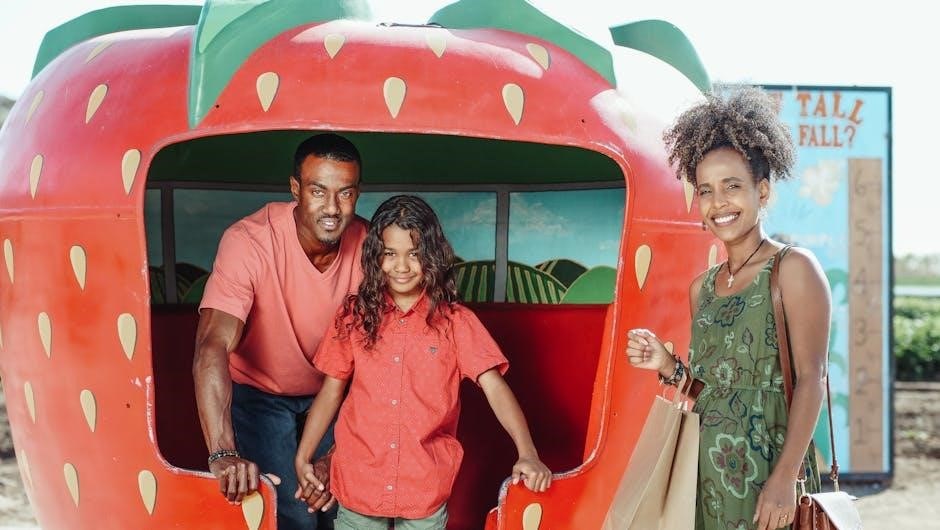Farm parenting offers a unique blend of challenges and rewards, combining hard work with the joy of raising children in a natural, hands-on environment. This guide explores the complexities of balancing farm life, child safety, and family bonding, providing practical advice for parents aiming to nurture resilient, resourceful, and environmentally conscious kids.
1.1. Understanding the Unique Challenges of Raising Children on a Farm
Raising children on a farm presents unique challenges, blending the beauty of nature with inherent dangers. Farm parents must navigate hazards like machinery, animals, and chemicals while balancing work demands. The environment, though educational, requires constant vigilance to ensure child safety. Additionally, fostering resilience and responsibility in children is crucial, as farm life teaches hard work and accountability. Parents must also manage time effectively, often juggling chores with childcare. Emotional support is vital, as the isolation of rural life can impact mental health. This guide offers strategies to mitigate risks, such as supervision and clear safety rules, helping parents create a nurturing yet protected upbringing for their children.
1.2. The Benefits of Farm Life for Children’s Development
Farm life offers unparalleled benefits for children’s development, fostering resilience, responsibility, and a deep connection with nature. Engaging in farm activities teaches kids the value of hard work and sustainability, while also promoting physical and emotional well-being. The hands-on environment encourages learning through experience, from caring for animals to understanding seasonal cycles. Interaction with nature enhances creativity and curiosity, while the sense of accomplishment from contributing to the farm builds self-esteem. Additionally, farm life often strengthens family bonds through shared responsibilities and traditions. These experiences cultivate a strong work ethic and environmental awareness, shaping well-rounded individuals prepared for life’s challenges.
1.3. Balancing Work and Parenting on a Farm
Balancing work and parenting on a farm requires careful planning and creativity. Farm parents often juggle demanding labor with childcare, making it essential to integrate children into daily tasks safely. Involving kids in age-appropriate chores fosters responsibility while allowing parents to manage workloads. Setting clear routines and boundaries helps maintain productivity while ensuring quality family time. Prioritizing tasks, delegating responsibilities, and seeking support from family or community can alleviate stress. Open communication with children about farm demands and safety is crucial. By blending work and parenting, farm families create a nurturing environment where children learn valuable life skills, strengthening both their development and the family’s agricultural legacy.

Child Safety on the Farm
Farm safety is critical for children, involving hazard identification, secure play areas, and teaching safety rules to protect them from machinery, animals, and chemicals while fostering independence.
2.1. Identifying Potential Hazards: Machinery, Animals, and Chemicals
Farms present unique hazards for children, including machinery, animals, and chemicals. Machinery, such as tractors and harvesters, poses entanglement and crushing risks. Animals, even seemingly friendly ones, can behave unpredictably, leading to injuries. Chemicals used in farming, like pesticides and fertilizers, are dangerous if mishandled. Parents must identify these hazards and implement safety measures, such as restricting access to dangerous areas and teaching children to approach animals cautiously. Guidance from resources like A Parents Guide to Kidsafe Farms and FarmSafe Australia provides practical strategies to mitigate risks and create a safer farm environment for children.
2.2. Creating a Safe Play Area for Children
Creating a safe play area for children on a farm is essential to protect them from potential hazards. Parents should fence off areas near the house, ensuring they are free from machinery, chemicals, and animal risks. Supervision is key, especially around water sources like ponds or creeks. Utilize natural elements like sand or grass for play surfaces and incorporate farm-friendly toys, such as swings made from driftwood or ropes. Teaching children to respect boundaries and avoid dangerous zones is crucial. Resources like A Parents Guide to Kidsafe Farms and FarmSafe Australia offer practical tips for designing safe play spaces that foster creativity while minimizing risks. Involving kids in maintaining their play area can also teach responsibility and awareness of farm safety.
2.3. Teaching Children Farm Safety Rules and Etiquette
Teaching children farm safety rules and etiquette is vital for their well-being and understanding of farm life. Start with basic rules like staying away from machinery, not touching sharp tools, and avoiding loose animals. Encourage gentle handling of animals and remind them to wash hands after interacting with livestock. Role-playing scenarios can help reinforce these lessons. Supervise children during farm activities and explain the consequences of ignoring safety guidelines. Positive reinforcement, such as praise for following rules, can motivate responsible behavior. Regular discussions about farm safety ensure children grow up with a strong sense of awareness and respect for their surroundings. These lessons not only protect them but also foster a deeper connection to farm life.

Engaging Kids in Farm Activities
Engaging kids in farm activities fosters responsibility and connection to nature. Assign age-appropriate chores, explore educational projects, and involve them in seasonal events to create lasting memories.
3.1. Age-Appropriate Chores and Responsibilities
Assigning age-appropriate chores helps children develop a sense of responsibility and connection to farm life. Younger kids can collect eggs or feed small animals, while older children can manage more complex tasks like tending to crops or assisting with animal care. Clear communication and positive reinforcement are key to fostering a strong work ethic. By involving children in farm responsibilities, parents not only teach practical skills but also instill values of hard work and teamwork. This approach ensures that children grow up understanding the importance of contributing to the family farm while staying engaged and motivated.
3.2. Educational Farm Activities for Children
Farm life offers countless opportunities for hands-on learning, making it an ideal setting for educational activities. Children can engage in planting and harvesting crops, learning about growth cycles and nutrition. Feeding and caring for animals introduces them to biology and responsibility; Seasonal events like harvest festivals or lambing can teach about natural cycles and sustainability. Parents can also incorporate STEM concepts, such as measuring crop yields or monitoring animal health; Creative activities like nature scavenger hunts or farm-themed art projects foster curiosity and creativity. These experiences not only educate but also deepen a child’s connection to the environment and their role within it, creating a well-rounded foundation for future learning and exploration.
3.3. Involving Kids in Seasonal Farm Events
Involving children in seasonal farm events fosters a deeper connection to agriculture and nature. Activities like harvest festivals, spring plantings, and animal births provide engaging learning opportunities. Kids can participate in tasks such as picking crops, feeding newborn animals, or preparing for seasonal celebrations. These events teach children about crop cycles, animal care, and the importance of sustainability. Seasonal farm events also encourage teamwork and responsibility, as children contribute to the farm’s operations. Parents can use these moments to educate kids about where food comes from and the effort behind producing it. By participating in these events, children gain practical skills and develop an appreciation for the rhythms of farm life, creating lasting memories and a strong bond with the natural world.

Education and Learning on the Farm
Farm life offers a unique, hands-on learning environment where children can explore science, nature, and practical skills through daily farm activities and seasonal events.
4.1. Using the Farm as a Learning Environment
The farm serves as a vibrant, hands-on classroom where children can explore the natural world, fostering curiosity and a deep connection to the environment. By engaging in daily farm activities, kids can learn about biology through plant growth, animal care, and ecosystems. Seasonal changes offer opportunities to teach about cycles, sustainability, and the importance of hard work. Parents can integrate farm life into lessons on science, math, and history, making learning interactive and meaningful. For instance, observing the life cycle of crops or calculating harvest yields can make abstract concepts tangible. This unique setting encourages children to develop critical thinking, responsibility, and a appreciation for where their food comes from, creating a foundation for lifelong learning and environmental stewardship.

4.2. Resources for Homeschooling on the Farm
Homeschooling on the farm is enriched by a variety of resources that blend education with hands-on learning. Parents can utilize activity books, lesson plans, and online tools tailored to farm-based education. These resources often focus on science, agriculture, and environmental studies, aligning with the farm’s natural setting. For example, guides like “Farm to School” and “Growing Minds” offer practical activities for teaching children about food systems and sustainability. Additionally, online platforms provide curriculum ideas for integrating farm life into math, reading, and history lessons. Local farming communities and educational programs also serve as valuable resources, offering workshops and materials to support homeschooling families. These tools help parents create a well-rounded, engaging educational experience that connects learning to the rhythms of farm life.
4.3. Teaching Children About Sustainable Farming Practices
Teaching children about sustainable farming practices fosters a deep appreciation for the environment and responsible agriculture. Parents can start by involving kids in daily farm activities, such as planting, harvesting, and composting, to demonstrate the importance of soil health and resource conservation. Hands-on learning through projects like building worm composters or creating pollinator gardens helps children understand the interconnectedness of ecosystems. Resources like “Growing Minds” and farm-based educational guides provide lesson plans and activities tailored to different age groups. By explaining the “why” behind sustainable practices, parents empower children to make eco-conscious decisions and develop a lifelong commitment to environmental stewardship. This approach not only educates but also strengthens the bond between children and the land they call home.

Emotional Well-Being of Farm Children
Farm life builds resilience in children through exposure to challenges like crop failures or animal care, fostering emotional strength. Parents can support mental health by encouraging open conversations and providing access to resources tailored for rural settings. Activities like family farm work strengthen bonds and create a sense of unity and purpose, helping children develop emotional stability and a strong connection to their environment.
5.1. Building Resilience in Children Through Farm Life
Farm life inherently teaches children resilience by exposing them to the natural cycle of life, where challenges like crop failures or animal health issues are common. These experiences help kids develop emotional strength and adaptability. By participating in farm activities, such as feeding animals or planting crops, children learn the value of hard work and perseverance. Encouraging them to problem-solve and take ownership of small tasks builds confidence and responsibility. Additionally, the unpredictable nature of farming teaches children to embrace failures as learning opportunities, fostering a growth mindset. Parents who model resilience themselves can further reinforce these qualities, helping their children thrive in both farm and broader life contexts.
5.2. Supporting Mental Health in Rural Settings
Rural farm life can present unique mental health challenges for children, including isolation and the emotional impact of farm-related stresses. Parents play a crucial role in fostering open conversations and creating a supportive environment. Encouraging outdoor activities and social interactions within the farming community can help counteract feelings of loneliness. Organizations like Embrace FARM provide bereavement support for farm families, addressing the emotional toll of accidents or losses. Teaching children coping strategies and promoting a balanced lifestyle can enhance their mental well-being. By prioritizing emotional support and seeking resources when needed, parents can help their children thrive in rural settings and build strong, resilient minds.
5.3. Fostering Family Bonds Through Farm Work
Farm work provides a unique opportunity to strengthen family relationships by working together toward common goals. Sharing responsibilities, such as feeding animals or harvesting crops, fosters collaboration and communication. Involving children in farm tasks teaches them the value of teamwork and hard work, while also creating lasting memories. Parents can use these moments to connect with their kids, sharing stories and passing down traditions. The sense of accomplishment from working together builds trust and mutual respect, laying the foundation for strong, enduring family bonds. By integrating farm activities into daily life, families can cultivate a sense of unity and shared purpose, enriching their relationships in meaningful ways.

Community and Social Involvement
Farm families can engage with local communities through farm visits, educational programs, and seasonal events, fostering social connections and a deeper understanding of agriculture for children.
6.1. Participating in Local Farming Communities
Engaging in local farming communities allows families to build strong social bonds and share knowledge. Parents can participate in farm visits, workshops, and seasonal events, fostering connections. These activities provide children with hands-on learning experiences, teaching them about agriculture and sustainability. Community involvement also offers opportunities for collaborative problem-solving and mutual support. By joining local initiatives, families can contribute to the preservation of farming traditions while ensuring a safer, more inclusive environment for future generations. This collective approach not only enriches family life but also strengthens the community’s agricultural heritage, creating a lasting impact on both kids and the farming landscape.
6.2. Involving Children in Farm-to-School Programs
Farm-to-school programs provide a unique opportunity to educate children about agriculture while promoting healthy eating habits. Parents can encourage participation by supporting local initiatives that bring fresh, farm-grown produce into schools. These programs often include educational activities, such as field trips to farms and hands-on workshops, where kids can learn about food production. By involving children in these efforts, parents foster a deeper appreciation for sustainable farming and community-supported agriculture. Additionally, farm-to-school initiatives help children develop a stronger connection to their food sources, encouraging healthier choices and a sense of accomplishment in contributing to their school community.
6.3. Organizing Family-Friendly Farm Events
Organizing family-friendly farm events fosters community engagement and creates lasting memories for children. Activities like harvest festivals, farm tours, and animal interactions can educate kids about agriculture while promoting fun. Parents can collaborate with local farms to host events that include hands-on experiences, such as feeding animals or planting crops. These gatherings not only teach children about food production but also encourage teamwork and responsibility. By involving kids in planning and executing events, parents help them develop organizational skills and a sense of accomplishment. Such events strengthen community bonds and highlight the importance of sustainable farming practices, making them a valuable addition to farm parenting strategies.

Parenting Strategies for Farm Families
Farm parents thrive by balancing work and family life through effective communication, time management, and seeking support, ensuring a nurturing environment for their children’s growth and well-being.
7.1. Communication Strategies for Farm Families
Effective communication is vital for farm families to thrive. Parents should establish daily check-ins to discuss tasks, concerns, and goals. Encouraging open dialogue fosters trust and collaboration. Clear expectations and active listening help prevent misunderstandings. Regular family meetings can address challenges and celebrate achievements. Teaching children to express their thoughts respectfully and confidently is key. Parents should also model healthy communication, showing empathy and patience. Incorporating technology, like shared calendars, can improve coordination. Additionally, involving children in decision-making processes helps them feel valued and prepares them for future roles. Strong communication strategies ensure a harmonious and productive family environment, essential for managing the demands of farm life while nurturing emotional well-being.

7.2. Managing Time Effectively as a Farm Parent
Managing time effectively is crucial for farm parents balancing work and family responsibilities. Create a structured schedule to prioritize tasks, ensuring both farming duties and family time are allocated fairly. Delegate age-appropriate chores to children, teaching them responsibility while freeing up time for critical tasks. Use tools like shared calendars or apps to coordinate family activities and deadlines. Set realistic goals and break tasks into manageable steps to avoid overwhelm. Regularly review and adjust schedules to adapt to seasonal demands or unexpected challenges. By staying organized and flexible, farm parents can efficiently manage their time, ensuring productivity while nurturing a supportive and loving family environment.
7.3. Seeking Support as a Farm Parent
Seeking support is essential for farm parents to manage the demands of farming and parenting. Joining local farming communities or support groups, like Embrace FARM, provides emotional and practical help. Resources from organizations such as FarmSafe Australia and KidSafe Victoria offer guidance on safety and child development. Engaging in farm-to-school programs connects families with educational opportunities. Building a network of fellow farm families fosters shared knowledge and mutual aid. Don’t hesitate to reach out to neighbors, mentors, or professionals for advice. By leveraging these resources, farm parents can create a balanced and thriving environment for their children while sustaining their agricultural legacy.

Farm Management and Succession Planning
Farm management and succession planning are crucial for ensuring the farm’s longevity and legacy. Protecting the farm’s heritage through preservation programs and clear succession strategies helps secure its future for generations. Involving children in decision-making and teaching financial literacy prepares them to take on responsibilities. Planning ahead ensures the farm remains a sustainable and viable enterprise, balancing family goals with agricultural practices. This section provides insights into creating a robust plan for the farm’s continued success and legacy.
8.1; Involving Children in Farm Decision-Making
Involving children in farm decision-making fosters responsibility and leadership skills, preparing them for future roles in managing the farm. Start by assigning age-appropriate tasks, such as feeding animals or monitoring crops, to teach them the value of contribution. Encourage their input in planning seasonal events or selecting new projects, helping them understand the farm’s operations. Open communication about challenges and successes builds their problem-solving abilities and emotional connection to the land. By involving them in decision-making, you nurture their confidence and ensure they develop a deep understanding of sustainable farming practices. This approach not only strengthens family bonds but also equips them to become capable stewards of the farm’s legacy.
8.2. Planning for the Future of the Family Farm
Planning for the future of the family farm involves creating a clear succession plan to ensure its longevity. Start by involving your children in discussions about their interests and goals, helping them understand the farm’s heritage and potential. Develop a legal framework, such as wills or trusts, to protect the farm’s assets and outline ownership transfer. Consider financial strategies like estate planning and insurance to safeguard the farm’s future. Encourage children to participate in decision-making to build their leadership skills and commitment to the farm. Regularly review and adapt the plan to address changing circumstances, ensuring the farm remains viable for generations. Professional guidance can also provide tailored solutions to secure the farm’s legacy.
8.3. Teaching Financial Literacy to Farm Children
Teaching financial literacy to farm children is essential for their future success. Start by involving them in basic budgeting and expense tracking, helping them understand the costs of running a farm. Encourage saving and investing by explaining how profits are reinvested into the farm. Introduce concepts like loans, interest, and financial planning to prepare them for managing farm finances. Use practical examples, such as paying them an allowance for chores, to teach the value of money. As they grow, involve them in decision-making about investments and resource allocation. This hands-on approach ensures they develop the skills to manage the farm’s finances responsibly and sustainably, securing its future for generations.
Raising children on a farm is a fulfilling journey, fostering resilience, responsibility, and a deep connection to nature. Embrace the lifestyle and inspire the next generation of farmers.
9.1. The Rewards of Raising Children on a Farm
Raising children on a farm offers unparalleled rewards, fostering a strong work ethic, practical skills, and a deep connection to nature. Kids learn empathy through caring for animals and develop resilience by overcoming challenges. The farm environment encourages creativity, problem-solving, and a sense of responsibility. Watching children contribute meaningfully to farm life builds their confidence and pride. Families often experience tighter bonds through shared labor and leisure, creating lasting memories. The farm’s rhythms teach patience and the value of hard work, shaping well-rounded individuals with a unique appreciation for life’s simplicity and beauty. These experiences lay a foundation for a lifetime of personal and professional growth, making farm parenting incredibly fulfilling.
9.2. Encouraging the Next Generation of Farmers
Encouraging the next generation of farmers involves nurturing a passion for agriculture and equipping children with the skills and knowledge needed to sustain farming traditions. By involving kids in daily farm activities, parents instill a sense of responsibility and ownership. Hands-on learning opportunities, such as tending to crops or caring for animals, help children develop practical skills and a deep appreciation for the land. Mentorship and open conversations about the challenges and rewards of farming can inspire young minds to pursue agricultural careers; Additionally, exposing children to the broader impacts of farming, such as environmental stewardship and community contributions, fosters a sense of purpose. These efforts ensure the legacy of farming continues through future generations, preserving both family traditions and the agricultural way of life.
9.3. Embracing the Lifestyle of Farm Parenting
Embracing the lifestyle of farm parenting means adopting a way of life rooted in hard work, resilience, and a deep connection to nature. It involves fostering a sense of community, where family bonds are strengthened through shared responsibilities and traditions. Parents who embrace this lifestyle often find joy in watching their children grow into capable, independent individuals with a strong work ethic. The farm serves as a classroom, teaching lessons in sustainability, responsibility, and the importance of caring for the land. By prioritizing quality time together and modeling values like honesty and stewardship, farm parents create a legacy that extends beyond the fields, shaping the next generation of leaders and caretakers. This fulfilling journey requires patience, dedication, and a love for the land and family.
